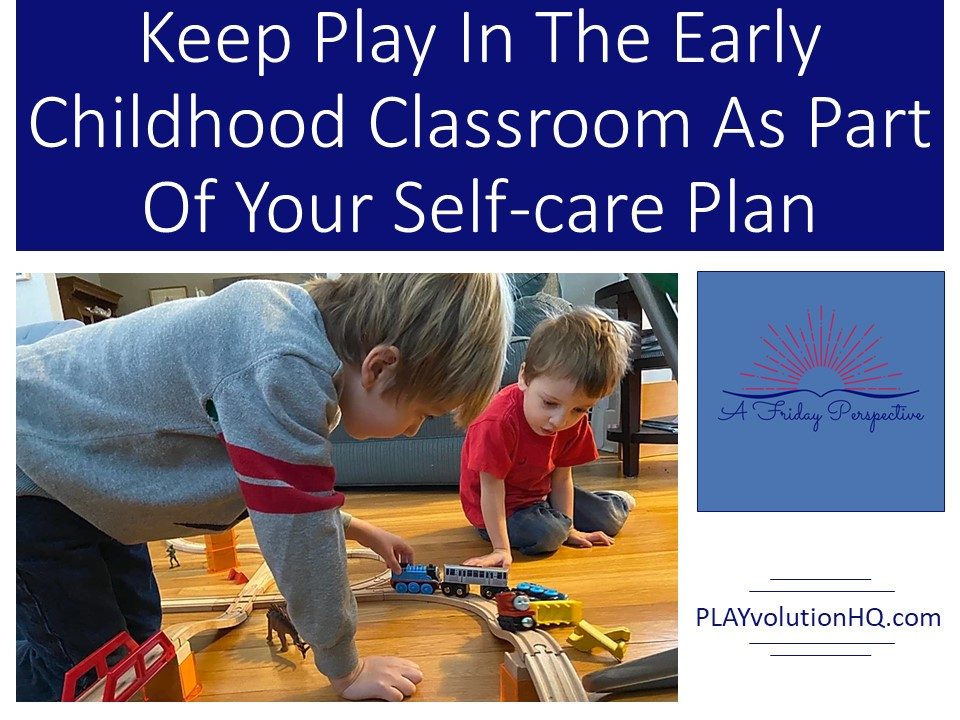
There’s an alarming trend in early childhood education that began in the early elementary years and is seeping down to the preschool years. The pushdown of academics has led to a near extinction of play in the early childhood classroom. Sound dramatic? Well, it is.

Before we discuss why play is vital to your self-care, let’s refresh our memories on what play is. Peter Gray is the leading expert on play and he has encapsulated the definition of play in 5 concise points. Using the right terms in your search bar, you can find this definition of play explained all over the Internet. There are scholarly articles, blog posts, journal entries, and more. One of my favorites for a quick and easy read on play is from a November 2008 article written by Peter Gray for his online column Freedom to Learn on PsychologyToday.com.
I will put this definition of play into my writing as frequently as I can because we have veered so far from play that I think it is important to keep a constant reminder of what it is. You often here, “Oh, all of our learning is based in play,” from programs, directors, or teachers who, from a quick observation of their programs, you’ll be able to see in fact don’t really know what play is at all.
So here it is, play as defined by Peter Gray through these 5 points:
- 1. Play is self-chosen and self-directed.
- 2. Play is activity where means are more valued than ends.
- 3. Play has structure, or rules, which are not dictated by physical necessity but emanate from the minds of the players.
- 4. Play is imaginative, non-literal, mentally removed in some way from “real” or “serious” life.
- 5. Play involves an active, alert, but non-stressed frame of mind.
Through play, children learn about the world around them, they learn about emotions, they learn about power struggles, they learn how to follow rules, and how to collaborate with others. Now aren’t those all pre-requisites to any sort of formal classroom learning experience? I could go on and on and on about the value of keeping play in early learning, and I will but that’s for another post. Today it’s about your self-care.
By removing play experiences from a child’s learning environment, you are making life harder on yourself. It is really that simple. You will find yourself fighting an unnecessary uphill battle of constant redirection, conflict management, behavior control, and ceaseless intervention required by you as the teacher. You will be less likely to facilitate learning because you will be spending the majority of your time fighting a monster you created
Children at play are focused. Children at play feel safe. Children at play aren’t looking for adults. Children at play are happy. Children at play are learning and growing.
And yes, it does take work to arrive at this blissful state of play. Children first need to learn expectations and often they do that by testing boundaries, but if the environment, expectations, and limits remain consistent, the children won’t take long to feel safe enough and free enough to slip into a zen-like state of play. Watching that happen is magical.
Play in this way is vital for the preschool classroom, and the kindergarten, and the first grade, and the second grade, and dare I even say third grade classrooms too.
By letting the children play, you’ll be preserving your own energy so that you can use it to make valuable observations of the children’s development rather than wasting it trying to fit a square peg in a round hole. Embrace play, work through the difficulties, and watch as your role shifts from prison guard to facilitator of magic, er, I mean learning.
PS I realize that there is a certain level of assumption being made here because some teachers may feel like they don’t have the resources – whether it be man power, administrative support, or something else – to implement play in the classroom, that too is a topic for another post. Just know, I understand that it might feel like a privilege that you don’t currently have. Contact me if you want to dive deeper into your own specific circumstance.
Post Author
Annie Friday is an educator, entrepreneur, podcast host, and birth doula. Most recently, Annie co-founded Blue Bridge Agile Learning Center in Grand Rapids, Michigan. Blue Bridge serves families engaged in self-directed education pursuits. Annie considers herself a recovering teacher engaged in the ongoing process of deschooling and relearning everything she has ever known about education. Annie is a public school parent who is actively working to decenter school in her family life. Annie believes all learning needs to be learner-led, consent-based, and rooted in play. Annie holds a master’s degree in early childhood education. Her teacher and family training focuses on supporting young children through play, nature, and mindfulness. Annie lives in Michigan with her husband and two young children. Together they enjoy playing outside hiking, camping, boating, and skiing as well as inside with board games, video games, dancing, doing yoga, and cooking.


Leave a Reply